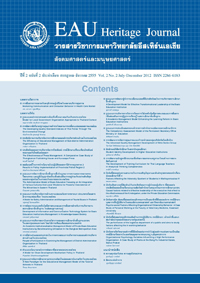รูปแบบการจัดการศึกษาขั้นพื้นฐานที่เน้นบูรณาการความหลากหลาย ทางวัฒนธรรม และภูมิปัญญาท้องถิ่นเพื่อส่งเสริมการอยู่ร่วมกัน อย่างสันติสุขของชนกลุ่มน้อยในภาคตะวันออกของประเทศไทย
Keywords:
การศึกษาขั้นพื้นฐาน, ชนกลุ่มน้อยในภาคตะวันออกของประเทศไทย, basic education, the minorities in Eastern ThailandAbstract
บทความนี้รายงานสภาพการศึกษา สภาพปัญหาที่เป็นอุปสรรคต่อการอยู่ร่วมกันอย่างสันติของชนกลุ่มน้อย ในภาคตะวันออก แล้วนำเสนอรูปแบบการจัดการศึกษาขั้นพื้นฐานที่เน้นการบูรณาการความหลากหลายทางวัฒนธรรมและ ภูมิปัญญาท้องถิ่นให้กับชนต่างวัฒนธรรม อันได้แก่ ชาวชอง พื้นที่ศึกษาโรงเรียนบ้านตะเคียนทอง ตำบลตะเคียนทอง อำเภอเขาคิชฌกูฏ จังหวัดจันทบุรี ชาวเขมรถิ่นไทย พื้นที่ศึกษาโรงเรียนบ้านเนินดินแดง ตำบลเทพนิมิตร อำเภอ โป่งน้ำร้อน จังหวัดจันทบุรี ชาวกะซอง พื้นที่ศึกษา ตำบลด่านชุมพล และซัมเร พื้นที่ศึกษาตำบลนนทรีย์อำเภอบ่อไร่ จังหวัดตราด ผลการวิจัยพบว่ารูปแบบการจัดการศึกษาชนต่างวัฒนธรรม ที่สภาพแวดล้อมทางการศึกษาประกอบไปด้วย นักเรียนที่มาจากกลุ่มวัฒนธรรมที่ต่างกัน คือ แนวทางในการจัดศึกษาในระบบโรงเรียนต้องดำเนินการสอนตามนโยบาย ของชาติในการสร้างความเป็นหนึ่งเดียวและเป็นเอกภาพของชาติ วัฒนธรรมที่ถ่ายทอดในระบบโรงเรียนจึงควรเป็น วัฒนธรรมไทย นักเรียนต้องเรียนตามหลักสูตร แบบเรียน วิธีการสอน และกระบวนการทางการศึกษาตามระเบียบ ที่กระทรวงศึกษาธิการกำหนด
The Administration Model of Basic Education Focusing on an Integration of Various Cultures and Local Wisdoms for Peaceful Coexistence of the Minorities in Eastern Thailand
This paper reports on the challenges to harmonious living among minority groups in the eastern part of Thailand. A model of basic education with emphasis in restoration of diversified cultures and abilities for these minorities to live together in harmony is proposed. People there consist mainly of Chong, Sumre and Thai-Cambodians.
A model of education management is presented for various minority cultures such as the Chong minority at Banntdakeanthong school Tdakeanthong sub-District Koukitchakuod District Janthaburi Province, Thai-Cambodia minority at Bannnerndindang school Thepnimit sub-District Pongnamron District Janthaburi Province, Kasong minority at Banndanchumpon and Sumre and Nonsee sub-District Borrai District Trad Province where all minorities have their own local cultures. The findings show that the proper model of basic education for this area follows Thai culture and the Thai policy in support of unity while recognizing the uniqueness of the minority groups. The research results in a concept of cultural education in an environment consisting of students who come from different minority cultures, like Chong, Shong, Sumre and Thai-Cambodia. The way to manage the education system in a school with minority populations is to follow a national policy emphasizing unity while recognizing the unique cultures present. The school system should focus on Thai culture by courses, text books and teaching methods approved by the ministry of education.





